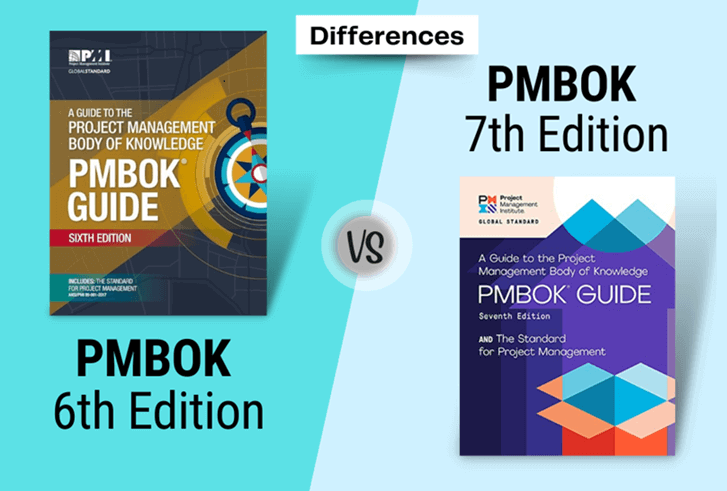

If you have been planning to take your PMP® certification exam and have been preparing for it, then you must have wondered what the difference between PMBOK 6 and PMBOK 7 is, and this article addresses that.
This article will give you complete clarity about PMBOK 6 and PMBOK 7 and how you should use both these guides to pass your PMP® certification exam.
So, without further ado, here are the three fundamental differences between PMBOK 6 and PMBOK 7:
PMBOK® 6 and prior versions discuss knowledge areas and processes, whereas PMBOK® 7 starts with the fundamental principles that guide the framework, leading to knowledge areas and processes.
Initially, people assumed that the PMBOK® 6 guidelines are prescriptive, i.e. they need to be followed as it is. However, that’s not the case, and the PMBOK® 7 has made it very clear by starting with the principles section, which is a more high-level view.
Now, these principles can be applied flexibly to create a tailored approach for each project based on the project requirements. This makes the application process much easier for practitioners worldwide, as they don’t have to look at the PMBOK as a prescriptive document.
Usually, the new version of PMBOK would replace the previous version completely, but that is not the case with PMBOK® 7.
PMBOK6 Guide will still be a guide for those looking for a process-based approach, whereas PMBOK will be a go-to document for those who want a principles-based approach. PMBOK 7 mentions that PMBOK 6 can be the go-to document for organizations looking for “How To” ways of doing things. So, PMBOK 7 is not a replacement for PMBOK 6 but is a top-layer document that enhances the overall understanding of the fundamentals of why we do things a certain way.
In PMBOK 6, we looked at the different knowledge areas independently, but in reality, projects are executed when all the knowledge areas come together in one form or another.
So, PMBOK 7 is now focusing on a project from a performance perspective than a knowledge perspective. The performance domains are a new concept that has been introduced in PMBOK 7. The goal of PMBOK 7 is to help practitioners deliver value to the organization by efficiently managing a project and ensuring customer engagement throughout the project lifecycle.
Above 3 were the fundamental differences between PMBOK 6 and 7.
Now, let’s explore what PMPBOK 7 covers and how it is helpful for the PMP exam. In case you need information about PMBOK6 Project Management Knowledge Areas, kindly watch the following video –
Even though PMBOK 7 gives you a performance-oriented approach to leading projects, PMBOK 7 is not needed from the PMP Exam perspective.
For passing the PMP exam, understanding the PMBOK 6, the agile fundamentals, and the agile practice guide is good enough.
If you look at key differences between PMBOK 6 and 7, you can see, PMBOK 7 puts more emphasis on the value delivery perspective than the knowledge perspective.
It is important to note that PMBOK 7 is not a replacement for PMBOK 6. It is only meant to provide high-level guidance on how to deliver value to the customer.
This critical point is that the PMP exam is unrelated to any book like PMBOK. It is based on the PMP exam content outline, which is something we should focus on. In January 2021, PMI published a new PMP Exam Content Outline along with exam content, which they provide only to Authorized Training Partners like iZenbridge.
For more details on PMP Exam and PMBOK Guide, kindly watch the following video –
If you have a question – Can I still use PMBOK6 for the new PMP exam? Watch the following video –
To cover the PMP exam content outline, you need expert guidance on connecting the dots between the content of PMBOK 6 and PMBOK 7 and the PMP exam content provided by PMI. If you are looking for structured training to pass your PMP® certification, then we recommend iZenBridge training programs for PMP – View the Schedule
Our training covers every topic of PMBOK 6 and 7 in great detail so that candidates are equipped to pass their PMP exams.
We also have pre-recorded material that we provide as part of the training material so that you can understand each lesson at your own pace. Our practice tests are created to emulate the actual PMP exam so that you get a good exam experience before attempting it.
Follow iZenBridge on Instagram: Follow for posts and updates related to the PMP exam tips and videos.
Also, subscribe to our YouTube channel, which has 57,000+ subscribers from over 50 countries. You can also follow iZenBridge on Twitter for posts and updates related to the PMP exam FREE tips and videos.
I also conduct Live Openhour Q&A sessions from time to time on Linkedin and YouTube; it is an opportunity to clear all your doubts in the Live session with me. Do check upcoming events on Linkedin and YouTube